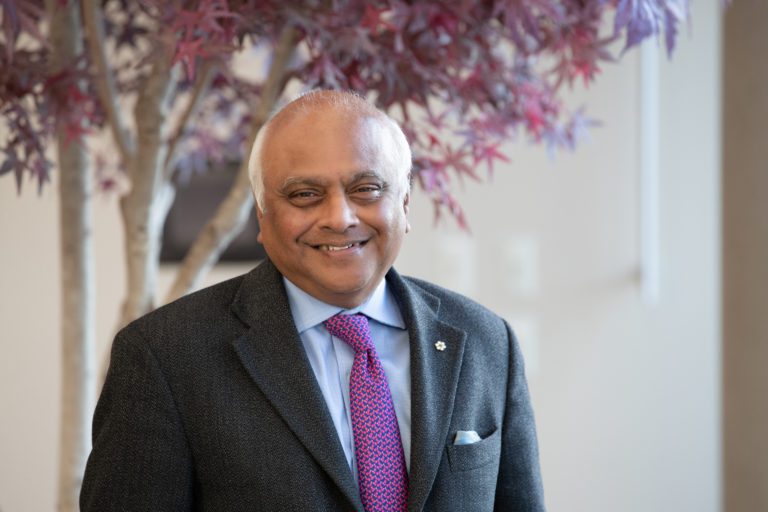Indigenous self-determination, data sovereignty, genomics, statistical analysis, brain health, and more – an impressive lineup at a two-day workshop comprised of pan-Canadian health researchers led by First Nations communities and investigators at PHRI and McMaster University and other collaborators, hosted at PHRI October 6 and 7, 2022.
Researchers from Six Nations of the Grand River (Ontario) Lac La Ronge Indian Band (Saskatchewan), Fort McKay First Nation (Alberta), Nation Huronne-Wendat (Quebec) and Oneida Nation of the Thames (Ont) communities – joined forces with the Canadian Alliance for Healthy Hearts and Minds (CAHHM) program- to share knowledge on Indigenous data. The first workshop, in fall 2019, in person, was followed by two virtual workshops in 2020 and 2021.

Jennifer Walker in biobank of CRLB-GMEL
The workshop kicked off with the keynote speaker, Jennifer Walker, an Associate Professor, Health Research Methods, Evidence, and Impact department at McMaster University, on “what we can do with health card record linkage” based on her experience using large health services databases as a core scientist and Indigenous health lead at ICES in Ontario. A Haudenosaunee member of Six Nations, Walker has led the validation of the Canadian Indigenous Cognitive Assessment tool and the implementation of the tool in Anishinabek communities of Northern Ontario.
As she was unable to attend the workshop this year, CAHHM lead investigator, Sonia Anand, sent a recorded presentation including an overview of where the study has been and where it’s going.
PHRI Senior Scientist @DrSoniaAnand1 @MacDeptMed and lead PI of long running #CAHHMstudy gives overview of @cahhm_study including #FirstNations cohort at start of our 2-day #Indigenous #healthresearch data sharing and learning workshop at #PHRI in #Hamont #indigenoustwitter pic.twitter.com/2w7DteHj7K
— PHRI | Population Health Research Institute ???????? (@PHRIresearch) October 6, 2022
‘Genomic divide’ for Indigenous Peoples
Laura Arbour, project manager at Silent Genomes, discussed her organization’s work to address the fact that “compared to what is becoming routinely available to other Canadians, Indigenous populations often have little or no access to genomic technologies and the research that drives them.” Arbour discussed Indigenous governance processes in place for protection and release of variants from the Indigenous Background Variant Library, the infrastructure and security of their database of Indigenous genomics, next steps for transfer and sequencing of approved samples and the vision for long-term sustainability.
Arbour’s colleague, Laurie Montour, spoke about the Summer Internship for Indigenous Peoples in Genomics Canada (SING Canada) that she represents.
A highlight of the workshop was the tour of the CRLB-GMEL laboratory and biobank, and a chance for the Silent Genomes team to meet and talk with Guillaume Pare, director of the lab, and some of his team. In a tour of the adjacent biobank, workshop attendees saw dozens of nitrogen-vapour tanks holding the bio-samples of research studies, including CAHHM.

L to R: CRLB-GMEL research development manager, Reina Ditta; PHRI program manager, Dipika Desai; lab operations manager, Tara Bryce; CRLB-GMEL director, Gui Pare; Silent Genomes’ Laura Arbour; Julia Hwang; and Laurie Montour, inside the CRLB-GMEL lab, October 6, 2022.
On day two, workshop participants were guided through a hands-on data analyses by PHRI Director, Statistics, Shrikant Bangdiwala and Diana Lewis, Assistant Professor and Canada Research Chair (Tier II) in Indigenous Environmental Health Governance, University of Guelph’s Department of Geography, Environment, and Geomatics.

L to R: PHRI’s Shrikant Bangdiwala; McMaster’s Jennifer Walker; Lac La Ronge’s Sylvia Abonyi, Lisa Mayotte and Robyn Klassen; and Ida Cornelius of Oneida Nation of Thames, Ontario.
COVID Community-First Nations study team members also attended the workshop and met separately to discuss that ongoing study involving the FN communities Lac La Ronge, Six Nations, and Wendat.

COVID CommUNITY-FN study members. Seated, L to R: Co-PI Russ de Souza; Six Nations’ Bonnie Davis, Jacqui Powless and Jane Henhawk; Lac La Ronge’s Robyn Klassen. Standing L to R: PHRI’s Sherry Zafar; Lac La Ronge’s Sylvia Abonyi; Six Nations’ Tristan Bemberry; and PHRI’s Dipika Desai.
Other presentations over the two days included:
- Miles Marchand, who will be the first Indigenous cardiologist in Canada when he finishes his training at UBC, spoke about the Indigenous Wellness Team within the new Canadian Heart Function Alliance of which he is part, working on patient-centered heart failure care in Indigenous communities.
- Judy Luu, a women’s heart health cardiologist and expert in cardiac MRI, spoke about exploring the complex pathways to healthy hearts and minds using machine learning, and capitalizing on the deeply phenotyped, innovated cohort study of CAHM.
- Yan Xu, a clinical fellow in adult thrombosis medicine at the University of Ottawa, with a passion to improve the inclusivity of clinical studies in the field of venous thrombosis, noted that “no studies have looked at whether Indigenous Peoples are at higher or lower risk of developing venous clots in Canada.”

Left to right: Miles Marchand, Okanagan Nation, UBC; Yan Xu, U of Ottawa; Jeff Brook, Fort McKay Nation, at PHRI on October 6, 2022.



